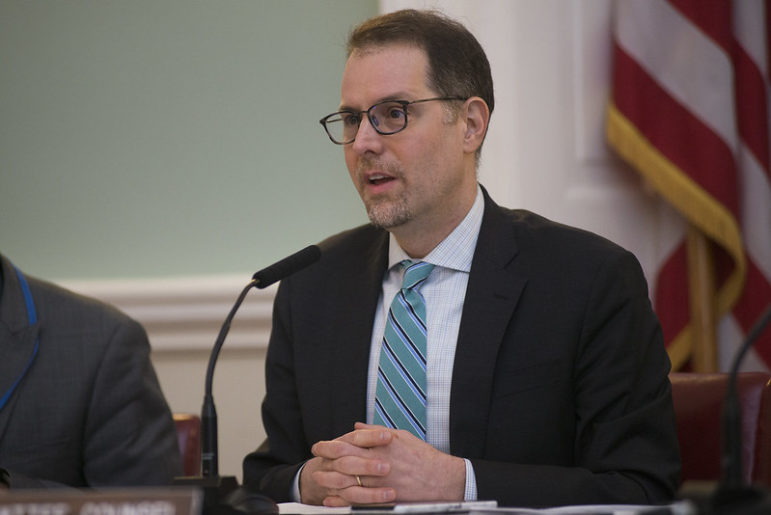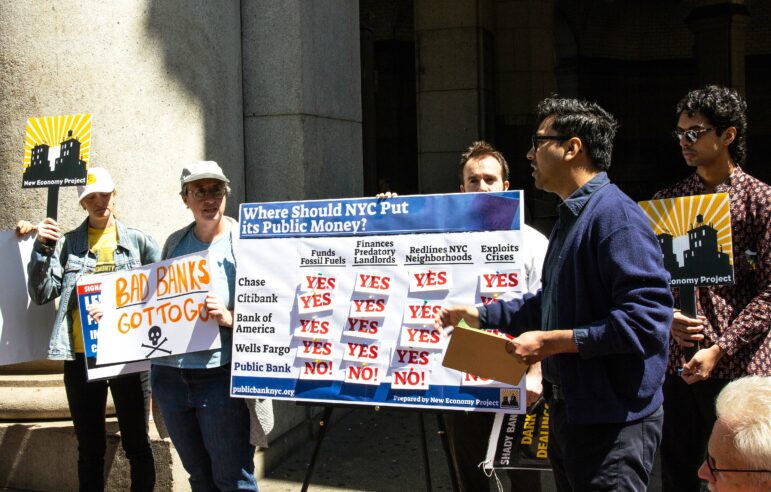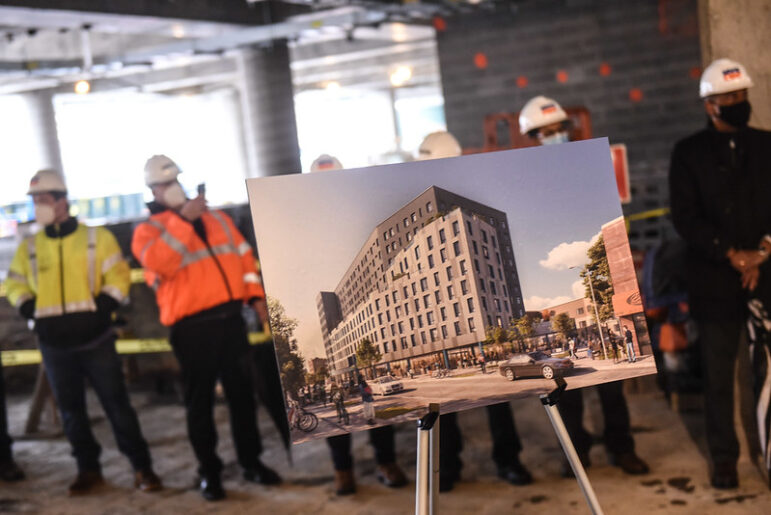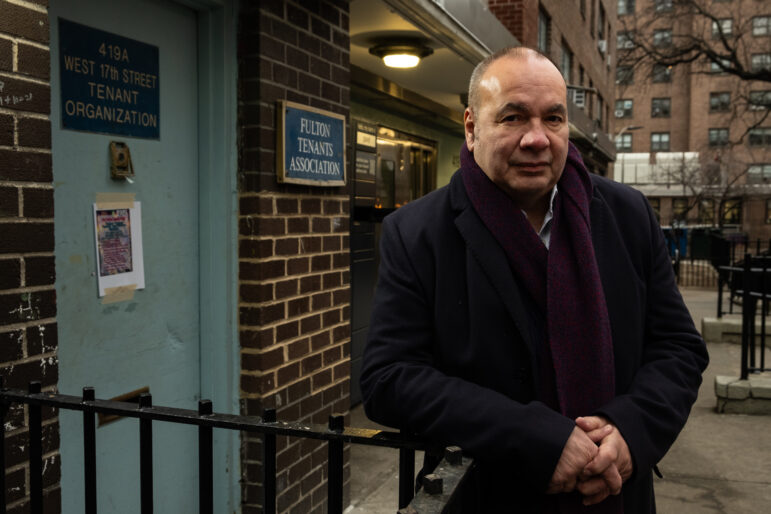The measures would require broader disclosure of where the city stashes its money now.

Jeff Reed for the New York City Council
Mark Levine, a Manhattan Democrat seen here in 2019, is the sponsor of two bills that would boost transparency around the huge sums of tax revenue New York City squirrels away before using it to fund city operations.The City Council is considering measures that would scrutinize the city’s relationship with corporate banks and other financial entities—disclosures that could pave the pathway to creating a municipal public bank in the future.
The first bill, Intro 2099, would require the Department of Finance (DOF) to submit a quarterly report, every March, June, September and December, which would include the average daily balance, interest rate or earning allowance, interest earned, costs and fees reported both net and gross for each account. The DOF would submit the report to the Speaker of the City Council and publish on its website for the public.
The second bill, Intro 2100, would require the Director of Management and Budget to issue quarterly reports on the city’s use of non-bank financial institutions such as payroll, lockbox, advisory, management, and bond-underwriting services. The reports would be issued to the Speaker of the Council, and would be posted on the Office of Management and Budget’s (OMB) official website for the public.
Both bills were introduced by Manhattan Councilmember Mark Levine and have support from Councilmembers Keith Powers, Kalman Yeger and Robert Cornegy and Public Advocate Jumaane Williams.
“Today we are taking a big step forward by introducing legislation which will give us the critical information we need to move ahead in this project—clear reporting on just where all of our money is sitting right now,” said Levine during an online press event last week. “The public should have this information. So we understand where our money is and what it is costing us. This is the first step.”
Moves in Albany as well
Levine said the City Council is also working with state elected officials in the Senate and Assembly. The state legislature is considering a bill, introduced in January, which would authorize local municipalities to lend money to public banks and authorize public ownership of stock in them. The bill is currently both in the state Assembly and Senate legislature’s banks committees for evaluation. The Senate bill S5565A and the Assembly bill A09665A; they were introduced by state Senator James Sanders and Assemblymember Ron Kim, respectively, both of Queens.
The City Council bills are part of a package of bills, targeting more financial transparency and how to help disparate communities, are now being developed to establish the country’s first municipal bank.
A public bank is a bank of which a state, municipality or other public entity is the owner–unlike a private bank, where the owners are usually private shareholders. Current major public banking models include the Bank of North Dakota and the German Public Bank System as well as many nations’ postal bank systems. In North Dakota, the public banking system was created to serve its agricultural economy and has existed for more than a century.
Last October, California passed a law that would allow local counties and municipalities to create public banks. The following month, San Francisco launched a task force to create a plan for establishing a public bank for that city. The task force report is due June 30th.
In New York, Public Bank NYC, a coalition of over 30 advocacy groups, has been pushing elected officials for the last two years to create a public bank system for local or state governments. NYPIRG, Chayya Community Development Corporation, New Economy Project, South Bronx Unite, Cooper Square Committee, New York Communities for Change, Brooklyn Cooperative Federal Credit Union are some of the members of the coalition.
According to the coalition, currently the city deposits its cash with 30 “designated banks,” including JPMorgan Chase, Bank of America, and among other large corporate banks. Coalition members said the current banking system underscores the central role many corporate banks which deal with the city’s finances and taxpayers monies play in financing industries such as fossil fuel and real estate — “fueling the climate crisis, tenant harassment and displacement, and widening inequality.”
They want a public bank that would instead invest the city’s holdings in entities like Community Development Financial Institutions, or CDFIs, which channel investment to distressed communities.
“By partnering with—and investing in—CDFIs, the public bank would increase their capacity to expand to even more communities and provide funding to worker-owned businesses and MWBEs that have been hardest hit by the pandemic,” said Linda Levy of the Lower East Side People’s Federal Credit Union, one of the oldest federal credit unions in the city.
“We are fighting for a public bank as part of a broader effort to fundamentally transform our unfair, extractive economy,” said Deyanira Del Rio, co-director of New Economy Project, which coordinates the Public Bank NYC coalition. “Through a public bank, New York City can support permanently-affordable housing, small and worker-owned businesses, green infrastructure, and other equitable development in Black and Brown neighborhoods—and divest from Wall Street banks that are actively harming New Yorkers, our economy, and the planet.”
Seeking flexibility and disclosure
According to the coalition, under current New York law, local governments who are interested in establishing a public bank must apply for a commercial bank charter, which advocates say forces the local government to change the public banking approach to conform to a system designed for private, for-profit banking.
The Sanders bill, the “New York public banking act” updates and authorizes the state Department of Financial Services to allow lending of public credit and public ownership of stocks of special-purpose public bank charters to counties and regions across the city.
The two pieces of City Council legislation would allow the public to further scrutinize the city’s relationship with corporate banks, said Andy Morrison, campaign director at the New Economy Project.
“It’s really just as simple as, the city has open data goals and city data should be available in ways that are responsive to the public that encourage public engagement,” he said. “Right now the information about [the city’s] banking relationships are virtually unknown and the costs incurred by the city. We don’t have that information and it should be available as a matter of transparency and public interest. That’s the rationale just for the bill(s), irrespective, of the campaign for a public bank”
According to the City Charter, the DOF commissioner is already required to keep a record of the accounts of deposits in, monies drawn from and banks and trust companies in which the deposits shall be made—essentially, the data covered by Intro 2099. Those records are shared with the City Comptroller but the details are not required to be made public, as the new law would mandate.
The quarterly reports covered by Intro 2100 would include balances, fees, and returns on any money market account holding city funds for each city bond and city note, its issuance costs, the amount and cost of any credit default swap payment and any other non-depository city financial services costs.
A complex goal
Some experts say the coalition’s vision for a public bank is a long-term process which will require extensive regulatory review and comes with its own set of challenges.
Andrea Batista Schlesinger, Partner at HR&A Advisors, and Ariel Benjamin, a Director at HR&A Advisors, both have been extensively involved in leading feasibility studies for public banks in major cities such as Seattle and Philadelphia, and say it is important to identify what problem the public bank is attempting to solve, then understand what type of public bank model would be chosen to be implemented.
“It’s really hard to create a municipal bank. It’s hard because it requires legislation and permission. It’s hard because the federal regulatory environment is designed to limit risk. And, it’s not a bad thing, but there is an extra hurdle for a public institution to be both a steward and a repository for funds and investment decisions,” said Batista Schlesinger. “By putting this legislation out there, it is really an important first step because you don’t have to rewind to even understand how the city is currently banking. That in and of itself can be a Herculean task. This campaign has already unfolded and in a smart and strategic way, I think the next critical step for them is to determine all the challenges.”
On the challenges, Benjamin said collateralization policies and insurance requirements are a few important factors to take into consideration. First, collateralization ensures that the city’s money is available and protected from unrecoverable financial loss at all times. Second, public banks seeking to accept retail deposits from the general public must typically meet insurance requirements which have been set up on the federal level by the Federal Deposit Insurance Corporation (FDIC).
A third consideration is the City’s credit rating, should the City seek to use their reserve balance to capitalize a public bank, or make loans that commercial banks deem too risky. “That’s what they’re putting on the line here potentially by engaging in public banking. By setting up a public bank, cities are putting their credit and credit ratings at risk which has deep implications for financing municipal projects and city budgets,” said Benjamin.
Morrison from New Economy Project said the coalition has been working with lawyers to address these challenges as it sets the path for a public bank in New York City.









6 thoughts on “Council Bills Could Pave the Way for a Public Bank in NYC”
‘…The first bill, Intro 2099, would require the Department of Finance (DOF) to submit a quarterly report, every March, June, September and December, which would include the average daily balance, interest rate or earning allowance, interest earned, costs and fees reported both net and gross for each account. The DOF would submit the report to the Speaker of the City Council and publish on its website for the public…’
Absolutely yes to the above.
=========================================================
‘…In New York, Public Bank NYC, a coalition of over 30 advocacy groups, has been pushing elected officials for the last two years to create a public bank system for local or state governments…’
Absolutely no to a NYC or NYS public bank. Do we really want the people who gave us NYCHA and the DMV to run a complicated operation like a bank? No way!
Yes to NYC public bank. Do we really want the people who brought us the crash and burn of 2008 managing our tax dollars with no option of voting them, the too big to fail bankers, out of office?
The Sanders bill is one of the best in the country right now, and follows a couple of weaker “study” bills from years past from other colleagues in the State Senate, which I and other members of the Public Banking Institute have been following and promoting in the past, e.g. https://www.slideshare.net/ScottOnTheSpot/return-to-prosperity
The Sanders bill is much better and would create an actual bank, closely following the example of the highly successful Bank of North Dakota (BND). The BND is run by bankers, not politicians and a Bank of New York would have the same autonomy.
Its power comes from leveraging vast sums of money the state already has, but which is currently in private bank hands, and not being available for use prior to state spending for citizen and business borrowing. By using state money for this purpose, people and businesses would be able to borrow at cheaper rates since a public bank has markedly lower overhead, and in some cases, be able to borrow in the first place when private banks are too busy using their deposits for speculations like derivatives that got the economy in trouble in the past and present (see the Repo market meltdown in the current crisis for example).
A public bank would support a strong network of community banks and is the reason why North Dakota has the highest per capita bank to people ratio in the country and one of the lowest foreclosure rates.
It works and is “Banking in the Public Interest,” as members of the public banking institute like to say.
Have you dealt with DMV license or tax operations in the llast 10 years or so? Fast, efficient, smart people who know their jobs. NYCHA has a worse legacy to deal with…even there, some spots of hope.
on the surface looks like a good idea. But like all other institutions, coops. non-profits and more – it is only as good as the Directors and Boards. Who choses the directors and who do they report too. Certainly can’t be something the general public decides as few are educated or have impartial knowledge.
i wish all banks will go into the public banking, it gives the poor man to get ahead after all,